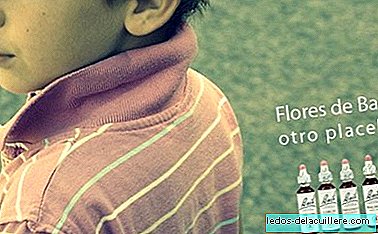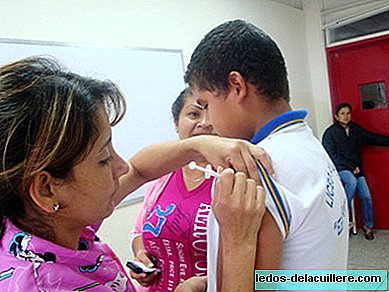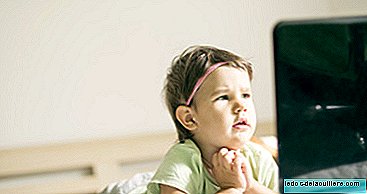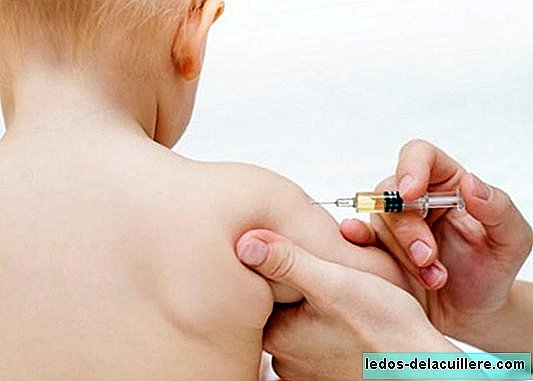
Yesterday we entered the exciting world of flower remedies that promise a lot and do little (like politicians, hear). The best known floral remedies are those of Bach, which are the ones that have been selling the longest and the ones that more people use.
We know of pregnant women who use them and mothers and fathers who use them with their children. The placebo effect is not discussed., so if someone wants to use these remedies as a placebo effect onwards. I personally, when I want to do the "healthy cure, healthy cure, take this you will see how it happens to you", I prefer to use cheaper things, but everyone is free to buy the placebo they want.
Yesterday we explained what are the Bach flowers and what are its fundamentals. Today we will explain what they can do for our children (well, what they say they can do) and we will also discuss what the scientific studies say about it. Go for it:
What can Bach Flowers do for my children?
Any. The answer is nothing beyond what a few drops of Fanta can do if you tell your child that they will make him feel better. Anyway, let's see what people who believe in Bach flowers about what they can do to babies and children (and adults), but summed up, because since it is a lie, it is not necessary that I put here an extensive treaty here. By the way, in brackets I put my comments, in case they serve to make the reading a little more enjoyable.
- Agrimony: For hidden emotional states. Help children who don't know how to express what they feel.
- Aspen: For children with fears of unknown or intangible things such as darkness (something very rare that certainly must be treated as it is).
- Beech: For intolerant children, who always want to be right, very perfectionists.
- Centaury: Children who submit to others, of weak will, with difficulty saying "no."
- Cerato: Doubtful children, questions, ask for advice before doing anything, insecure (nothing to help them get things for themselves or try to give them tools so that the achievements come slowly. A few drops and ready).
- Cherry Plum: Children with many tantrums, with fixed and obsessive ideas (for all two-year-olds, no doubt).
- Chestnut Bud: Children who find it difficult to learn, who always fall into the same error (for all children of one year and for those who are not very capable of learning any subject, that is rare, rare).
- Chicory: For self-centered children, who need a lot of affection, who don't want to be alone or want to share their things (for all children under 3-4 years, then).
- Clematis: Dreamy, distracted, absent children. With lack of concentration (this should be for those children who are in one place but would rather be in another ...).
- Crab Apple: Children who can't stand staining, maniacs, they need everything to be orderly (but, what's wrong? I didn't give this one anything ...).
- Elm: For strong children who suddenly want to throw in the towel, when the responsibilities overwhelm them ("Mom, I can't anymore ... between school, piano, football, English and everything else, I only live two hours awake in which I'm not doing something controlled by adults. Go on, give me a few drops of those ").
- Gentian: For depressed, negative, pessimistic children, who get discouraged quickly.
- Gorse: For the moment of total despair. If they are in a situation that they see no way out. Uncommon in children
- Heather: For children who don't listen but want to be heard, children in need, self-pity (this is what I call a communication problem. "Let's see why it is ... no, wait, give it a few drops and fix it").
- Holly: For children who show hatred, jealousy, desire to get revenge, who easily offend (two don't fight if one doesn't want to, many children feel revenge because parents are too aggressive or unfair, if not, a little of dialogue usually goes quite well to approach positions).
- Honeysuckle: For children who live in the past, who undergo significant changes and suffer regressions (does that sound like supporting the child in the changes and helping them overcome them?).
- Hornbeam: For children with mental fatigue due to routines, study, etc., that if they change their activity they have strength again (boredom, it is called boredom… later, when they do what they like, they enjoy).
- Impatients: For impatient and irritable children. They want it all fast, they can't wait ("My son, I understand that you want to eat a cheese sandwich right now, but you'll have to wait for him to buy the bread and prepare it for you").
- Larch: For children with fear of making a fool of themselves, without self-confidence, with little value (lack of self-esteem is a very important issue to leave it in the hands of "Larch", show your children every day that you love them without conditions, which are important to you, whatever they are and whatever they do and you will see how their self-esteem grows).
- Mimulus: For children with fear of things known as insects or animals (because if you don't give the drops they will grow and of course, a 30-year-old uncle running in front of a mosquito is pathetic).
- Are you really still reading this? Ok, ok, well, I'm still ...
- Mustard: Children who spend a few days depressed but for no apparent reason are happy again, falling back into depression later (well, we must see what these mood swings are due to, right? at school… ).
- Oak: tremendously hardworking children, who continue to do what they have to do even when the body does not give up (I do not know if there are children of these ...).
- Olive: Children who are in a state of total exhaustion, both physical and mental.
- Pine: For children with feelings of guilt, they blame things that don't have to be their fault, they are never satisfied.
- Red Chestnut: Children who care too much about others, a disease of their pet makes them think that they will lose it (there is nothing like life to learn everything ... if the pet has to die, then it will die whatever you do , if you don't have to die, the child will learn that a disease is not synonymous with death).
- Rock Rose: For children with nightmares, terror or extreme fear. If you have suffered a serious accident (these are the ones that have to be rescued quickly, right?).
- Rock Water: For children who demand a lot of themselves, very disciplined, very critical of themselves, to the point of not being able to sleep and be stressed (we will have to see why they demand so much ... it is usually because someone demands them a lot and they want show that they are really capable of doing it).
- Sclerantus: For undecided, trembling children, who get dizzy easily, frequent mood swings.
- Star of Bethlehem: For children who suffer some psychological shock. Depression due to the death of a family member, trauma, accidents, bad news (again, time and life end up teaching how to live with it, meanwhile, nothing better than clothing the child, giving our support, solving their doubts ...).
- Sweet Chestnut: For children who feel very distressed, who feel that everything is going to end, that there is no way out. Uncommon in children
- Vervain: Fánaticos children, revolutionaries, who get angry at the injustices, who want to convince others, who want to show everything they have learned in school, who live in tension for not knowing how to relax (these are the children that will change the world , for God's sake, that nobody gives you droplets of anything, that nobody tries to change them ...).
- I came: For children who want power, they want to dominate, send, be right, lead others. Those known as "dictator children" (and does anyone really believe that with a few drops the child will stop treating his parents as if they were slaves?).
- Walnut: It's a remedy for changes. To use when an important change approaches: nursery, sleep alone, you will have a brother.
- Water Violet: For children who like loneliness, they are reserved, they feel different from others, sometimes even superior. They have difficulty communicating (we will have to see why they feel different, why they feel superior ... they could have some giftedness, they could be really different or they could be just one more, but it should be seen, not giving flowers).
- White Chestnut: For children who have persistent ideas, repetitive thoughts, who live in tension because they are always going around the same thing.
- Wild Oat: For children who feel dissatisfied or bored for doing things that do not feel a priority, feeling of internal emptiness. It usually happens more in adulthood (although I know of many children who get bored like oysters with what things that adults insist on doing "to learn" or "to have fun").
- Wild Rose: Apathetic children who don't care about everything. They are bored, they don't care about their situation and they are simply because they have to be (it has to be very sad to be a child and decide that everything doesn't matter).
- Willow: For resentful children, who complain and lament but without big fuss. They blame others for what happens to them (whining children, which attract attention ... pay more attention to your child, spend more time with him, see how he begins to complain less).
After this torture to which I have subjected you, I suppose that you will reach the same conclusion as me: if I am a father and my children have these problems, I will make use of communication and dialogue, of sharing time and experiences with them and of improving our relationship to help them, but I will never leave it in the hands of a few drops that come from a dilution made with flowers that are supposed to transmit the energy they contain to my son.
Anyway, just in case someone prefers to throw droplets before going to the root of the problems, I tell you what do the studies say about it:
What is the scientific evidence of Bach Flowers
The most complete study conducted with Bach flowers It is the one made by Edzard Ernst in August 2010, which can be read completely here.
I will only comment on this because it is a meta-analysis (a study in which many well-conducted studies are looked at, to have a larger sample and get a more accurate conclusion) in which studies conducted until May 2010 were analyzed and for that the manufacturers of the floral products were requested to send tests carried out by themselves, if they had, even if they had not been published. It also investigated related articles in specialized magazines.
To find the studies, a search was carried out in the main virtual libraries (Medline, EMBASE, BIOSIS, Cochrane Library and AMED). Only randomized studies were included (people are chosen randomly within a population group that can believe in bach flowers or not, it is not known) and in which the effect of Bach Flowers was compared with a placebo.
Six valid studies were found, in which the Bach Flowers were used for students during exam time, children with ADHD and surgical patients, the results in all of them being that "no significant differences were observed between the groups", with which It is concluded that, today (and tomorrow, I can assure you already), Bach Flores therapies cannot demonstrate evidence that they have a superior effect than a placebo.
What is the danger of dealing with Bach Flowers?
The danger of treating children with Bach flowers they are the same as those that arise from using homeopathy if parents refuse, when using these methods, other treatments that do have an effect and are necessary.
Since Bach Flowers are more associated with emotional or relationship problems, the danger could be the one I have commented above, that some parents do not seek a real solution to their child's problem and that they give prominence to the flower droplets that do nothing.
Beyond that, the only danger is for the wallet, that you spend your money uselessly.












